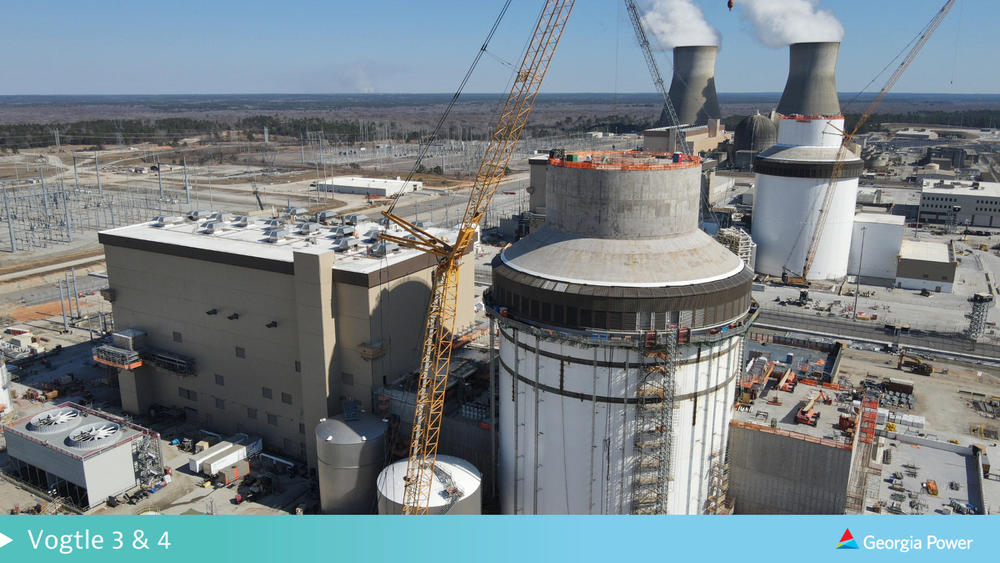
Section Branding
Header Content
Utility begins loading fuel at new Georgia nuclear plant
Primary Content

Workers have begun loading radioactive fuel into a new nuclear reactor in Georgia, utilities said Friday, putting the first new American nuclear reactor built in decades on a path to begin generating electricity in coming months.
Georgia Power says workers will transfer 157 fuel assemblies into the reactor core at Plant Vogtle, southeast of Augusta, in the next few days. There are already two reactors operating at the plant, with fuel being loaded into a third unit and a fourth unit still under construction.
Chris Womack, chairman and CEO of Georgia Power, the largest unit of Atlanta-based Southern Co., said in a statement that fuel loading shows “steady and evident progress” at Vogtle.
“We’re making history here in Georgia and the U.S. as we approach bringing online the first new nuclear unit to be built in the country in over 30 years,” Womack said. “These units are important to building the future of energy and will serve as clean, emission-free sources of energy for Georgians for the next 60 to 80 years.”
After the 90 tons (82 metric tonnes) of uranium oxide is loaded by a crane into the reactor, operating company Southern Nuclear will test whether the plant’s cooling and steam supply system work while fuel is inside the reactor at the super-high temperatures and pressures created by splitting atoms. Operators will then start generating electricity and link the plant to the transmission grid, with the reactor planned to reach commercial operation by the end of March.
The Georgia Public Service Commission approved the new reactors in 2012, and the third reactor was supposed to start generating power in 2016. The cost of the third and fourth reactors has climbed from an original estimate of $14 billion to more than $30 billion.
The Nuclear Regulatory Commission approved plans to load the fuel in August. Approval was delayed because much of the third reactor's wiring had to be redone after federal regulators found major flaws. Southern Co. also fell behind on inspection documents that had to be completed before the NRC could sign off.
Georgia Power's 2.7 million customers are already paying part of the financing cost and state regulators have approved a monthly rate increase of at least $3.78 a month as soon as the third unit begins generating power. But the elected five-member Public Service Commission will decide later who pays for the remainder of the costs. The utility has other unrelated rate increases awaiting a decision.
The fourth unit is supposed to be completed in late 2023. The two new units combined are projected to produce enough power for more than 500,000 homes and businesses.
Vogtle is the only nuclear plant under construction in the United States. Its costs and delays could deter other utilities from building such plants, even though they generate electricity without releasing climate-changing carbon emissions.
Georgia Power owns 45.7% of the two reactors, while Oglethorpe Power Corp. owns 30% on behalf of 38 power cooperatives. The Municipal Electric Authority of Georgia owns 22.7% on behalf of 49 city-owned utilities, while the city of Dalton's utility owns 1.6%. MEAG has contracts to sell electricity from Vogtle to the city-owned utility in Jacksonville, Florida, and to some electric cooperatives and city utilities in Alabama and the Florida Panhandle.
The other owners of Vogtle are trying to shift costs onto Georgia Power. Oglethorpe, MEAG and Dalton all sued Georgia Power earlier this year, claiming the company was trying to bilk them out of nearly $700 million by unilaterally changing a contract.
Under a 2018 deal, Georgia Power agreed to assume all cost overruns above a certain level. In exchange, the co-owners would sell part of their ownership shares to Georgia Power. Oglethorpe and MEAG say projected overruns have reached that level, but Georgia Power said the threshold is $1.3 billion higher than the level claimed by the co-owners.
Georgia Power is settling MEAG's lawsuit in exchange for making at least $76 million in payments to MEAG.

